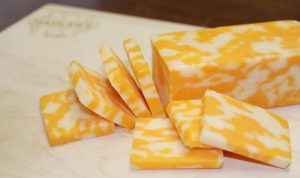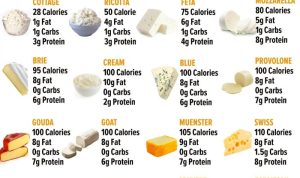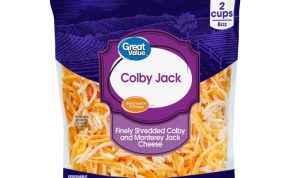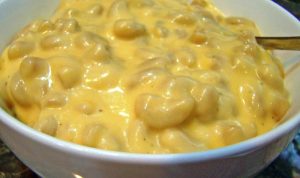Nutritional Breakdown of Broccoli and Cheese
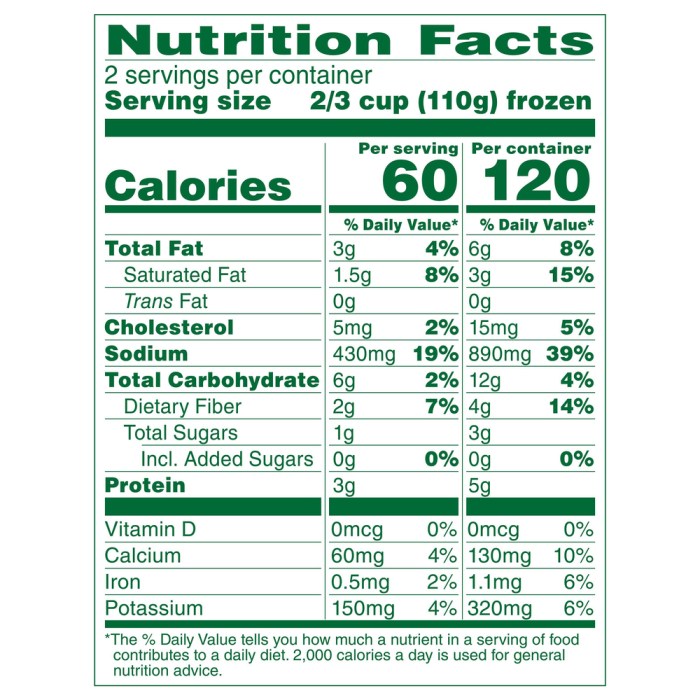
Broccoli and cheese nutrition – Broccoli and cheese, a classic pairing enjoyed worldwide, offers a blend of nutrients that contribute to overall health. However, understanding the nutritional profile of each component and their combined effect is crucial for making informed dietary choices. This analysis compares the nutritional content of a single serving of cooked broccoli and shredded cheddar cheese, highlighting both their benefits and potential drawbacks.
Macronutrient and Micronutrient Comparison
The following table provides a comparison of the macronutrients (carbohydrates, protein, and fat) and select micronutrients (vitamins A, C, K, calcium, and iron) in one cup of cooked broccoli and one cup of shredded cheddar cheese. Note that these values are approximate and can vary based on factors like growing conditions and cheese processing. The “Total” column represents the combined nutritional value of a serving containing both broccoli and cheese.
| Nutrient | Broccoli (per cup) | Cheese (per cup) | Total (per serving) |
|---|---|---|---|
| Carbohydrates (g) | 10 | 1 | 11 |
| Protein (g) | 3 | 20 | 23 |
| Fat (g) | 0.5 | 30 | 30.5 |
| Vitamin A (IU) | 500 | 0 | 500 |
| Vitamin C (mg) | 80 | 0 | 80 |
| Vitamin K (mcg) | 100 | 0 | 100 |
| Calcium (mg) | 40 | 720 | 760 |
| Iron (mg) | 1 | 0.5 | 1.5 |
Health Benefits of Broccoli and Cheese
Consuming broccoli and cheese offers several potential health benefits, although it’s important to remember that these benefits are dependent on overall diet and lifestyle.
Broccoli’s health benefits include:
- Bone Health: Broccoli contains Vitamin K, crucial for bone metabolism and calcium absorption.
- Immune Function: Rich in Vitamin C, an antioxidant supporting immune system function.
- Digestive Health: High in fiber, promoting healthy bowel movements and gut microbiome.
Cheddar cheese’s health benefits include:
- Bone Health: Excellent source of calcium, essential for strong bones and teeth.
- Immune Function: Contains protein, crucial for antibody production and immune cell function.
- Nutrient Absorption: Fat content aids in the absorption of fat-soluble vitamins.
Potential Drawbacks of High Broccoli and Cheese Consumption, Broccoli and cheese nutrition
While broccoli and cheese offer numerous benefits, excessive consumption can lead to certain drawbacks.
Broccoli’s nutritional powerhouse is undeniably boosted by the creamy addition of cheese, creating a delicious and healthy combination. Understanding the complete nutritional profile requires examining both components; for a detailed breakdown of one key cheese, check out the comprehensive guide on american cheese nutrition facts , which helps you balance your broccoli and cheese masterpiece for optimal health benefits.
Potential negative effects include:
- Gas and Bloating: Broccoli’s high fiber content can cause gas and bloating in some individuals.
- High Sodium Intake: Cheese, particularly cheddar, is often high in sodium, potentially contributing to high blood pressure if consumed in large quantities.
- High Fat Intake: Cheese is high in fat, excessive consumption can contribute to weight gain and other health problems if not balanced with a healthy diet.
Broccoli and Cheese Combinations: Broccoli And Cheese Nutrition
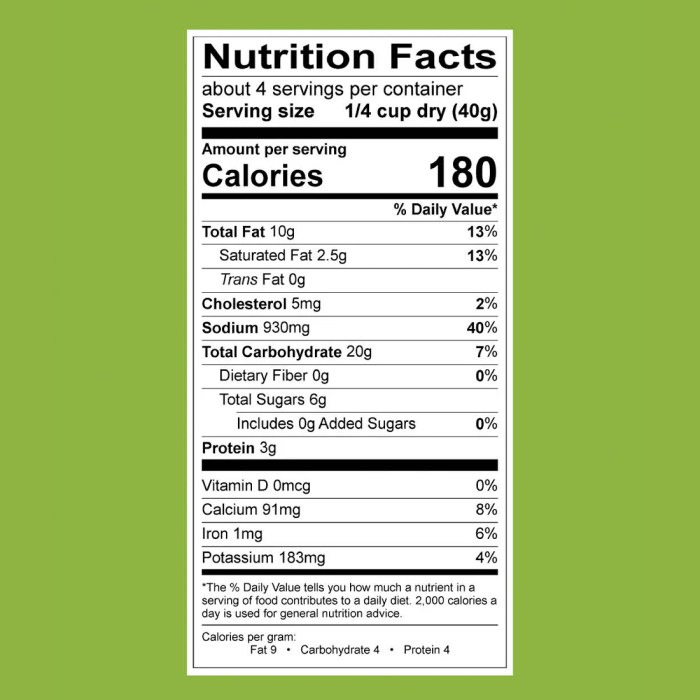
Broccoli and cheese, a classic pairing, offers a delicious and surprisingly versatile nutritional profile. The nutritional value of this combination, however, can significantly vary depending on the type of cheese used and the cooking method employed. Understanding these variations allows for informed choices to maximize the health benefits while minimizing potential drawbacks.
Nutritional Variations with Different Cheese Types
The choice of cheese dramatically impacts the overall nutritional content of your broccoli and cheese dish. Different cheeses offer varying levels of fat, calcium, and sodium. The following table compares three popular cheese options:
| Cheese Type | Fat Content (approx. per 1 oz) | Calcium Content (approx. per 1 oz) | Sodium Content (approx. per 1 oz) |
|---|---|---|---|
| Cheddar | 9g | 200mg | 170mg |
| Mozzarella | 8g | 180mg | 70mg |
| Parmesan | 7g | 350mg | 200mg |
*Note: These values are approximate and can vary depending on the brand and type of cheese.*
Effects of Cooking Methods on Nutritional Content
Cooking methods significantly influence the nutritional value retained in both broccoli and cheese.
The impact of different cooking methods on the nutritional content of broccoli and cheese is significant. Proper techniques can help retain valuable nutrients, while improper methods can lead to nutrient loss.
- Steaming: Retains the most nutrients in broccoli, preserving vitamins and minerals. Cheese added after steaming avoids significant nutrient loss.
- Boiling: Can leach out some water-soluble vitamins from broccoli. Adding cheese after boiling minimizes this effect.
- Roasting: Can enhance the flavor of both broccoli and cheese, but some nutrients might be lost due to high temperatures. Using lower temperatures and shorter roasting times can help mitigate this.
Nutrient-Dense Broccoli and Cheese Recipe
This recipe prioritizes nutrient density and minimizes sodium content.
Ingredients:
- 1 large head of broccoli, cut into florets (approximately 2 cups)
- 1/2 cup part-skim mozzarella cheese, shredded
- 1/4 cup grated Parmesan cheese
- 1 tablespoon olive oil
- 1 clove garlic, minced
- Salt and freshly ground black pepper to taste (use sparingly)
Instructions:
- Preheat oven to 400°F (200°C).
- Steam broccoli florets until tender-crisp (about 5-7 minutes).
- In a bowl, toss the steamed broccoli with olive oil, minced garlic, salt, and pepper.
- Spread the broccoli in a single layer on a baking sheet.
- Sprinkle with mozzarella and Parmesan cheese.
- Bake for 10-12 minutes, or until cheese is melted and bubbly.
Common Queries
Can I eat too much broccoli and cheese?
While both are nutritious, excessive consumption can lead to bloating, gas, and high sodium intake (depending on the cheese). Moderation is key.
Are there any interactions between broccoli and cheese?
No significant negative interactions are known. However, the high calcium in cheese can slightly reduce the absorption of some minerals from broccoli.
What type of cheese is best for pairing with broccoli?
It depends on your preference! Cheddar, mozzarella, and parmesan all offer different flavor profiles and nutritional values. Experiment to find your favorite.
Is it better to steam or roast broccoli?
Steaming retains more vitamins, while roasting can enhance flavor. Both methods are healthy choices.



